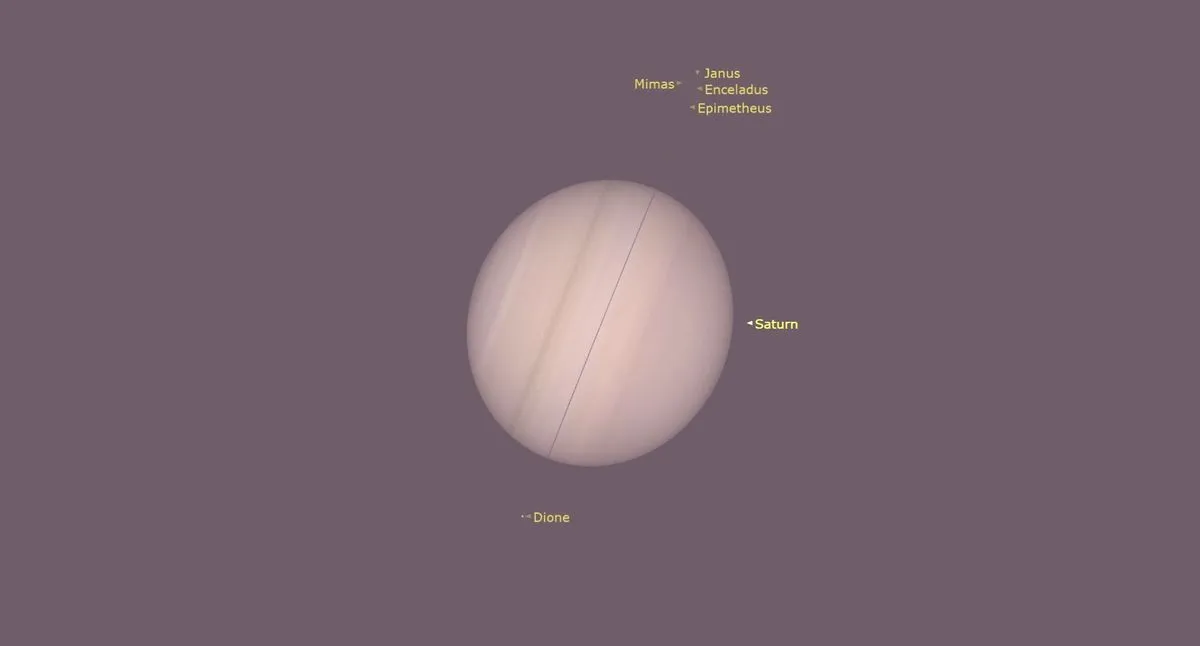
This weekend, skywatchers will witness a remarkable astronomical phenomenon as Saturn's iconic rings align edge-on with Earth for the first time since 2009. This event, known as the ring plane crossing, will occur on Sunday, March 23, at 12:04 p.m. EDT (1604 GMT), when our planet passes through Saturn's ring plane, according to In-the-Sky.org. This rare alignment happens every 13 to 15 years, leading to a temporary invisibility of the stunning rings that define this gas giant.
Unfortunately, this ring plane crossing will not be easily visible for most observers on Earth. For those located in mid-northern latitudes, Saturn will be positioned close to the pre-dawn sun, making it difficult to spot. The planet will be well below the slanted morning ecliptic, limiting visibility for many skywatchers in these regions. Conversely, observers in mid-southern latitudes will have the best chance to see Saturn without its rings, although they will have to contend with the brightening morning twilight over the eastern horizon.
Saturn, known for its breathtaking rings, completes one orbit around the sun every 29.4 Earth years. During this extensive cycle, the visibility of Saturn's rings fluctuates as the planet rotates on an axis tilted at 27 degrees. At times, the rings are tilted towards Earth, offering a spectacular view, while at other times they align edge-on, rendering them nearly impossible to see or appearing as a thin line crossing the planet's disk.
The rings of Saturn are primarily composed of water ice, along with small particles of rocks and dust. These rings are believed to be the remnants of comets, asteroids, or shattered moons that were torn apart by Saturn's powerful gravitational pull. Spanning an impressive 170,000 miles (273,600 kilometers) across, the rings are only about 30 feet (10 meters) thick, giving them a delicate, wispy appearance from any angle. However, when aligned edge-on with Earth, they reflect minimal light, making them almost invisible.
As Saturn orbits the sun, our perspective of the planet shifts. When Saturn is tilted toward us, we are able to see the upper side of its rings. Conversely, when the planet tilts away, we can only glimpse the lower side. During these transitions, Earth occasionally passes through Saturn's ring plane, resulting in a temporary ringless view of Saturn. This occurs because we align with the edge of the rings, obscuring our view of their magnificent structure.
Over the past seven years, Saturn's rings have gradually tilted toward this edge-on alignment, leading to the current phenomenon. Fortunately, this edge-on view is temporary. After the crossing, Saturn's rings will slowly begin to tilt back toward Earth, transforming into a thin line within just a few hours. Over the subsequent months, the rings will become increasingly visible as Saturn continues its orbit. By 2032, they will reach their maximum tilt, providing skywatchers with an optimal view once again.
Don't miss this unique opportunity to experience Saturn's rings in a way that has not been seen in over a decade. Stay tuned for more updates on this celestial event and prepare for the gradual return of Saturn's mesmerizing rings in the months to come!